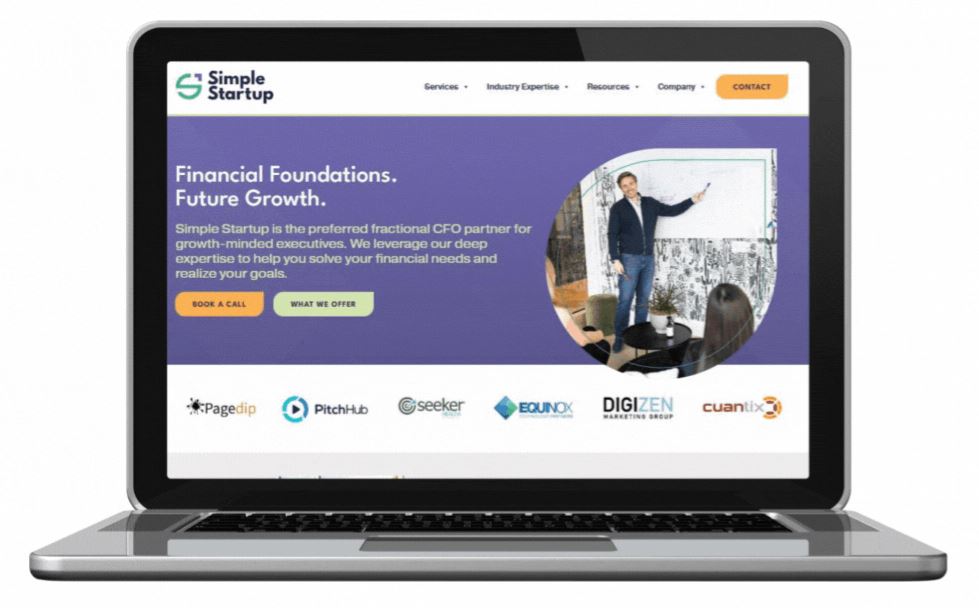Accountant vs. Controller
We recently addressed how to know if you need a bookkeeper or an accountant, but to quickly recap the differences between the two, it all boils down to cash accounting vs. accrual accounting. To quote our blog:
Where bookkeeping helps a business owner stay organized, accounting takes these transactional records a step further giving business owners a way to distill and process their financial transactions into something that is a truer representation of reality and hence considerably more meaningful to the business – THAT is accounting.
Now let’s build on that definition and take things a step further by looking at the difference between an accountant and a controller. We like metaphors at Simple Startup, so if an accountant is a bookkeeper on steroids, then a controller is an accountant on the steroids of the FUTURE!

What is an Accountant?
Accountants can still serve as bookkeepers (or they analyze the work of a bookkeeper) to ultimately maintain against discrepancies in a business’s books like fraud (eek, scary!). Many accountants go on to become (Certified Public Accountants) CPAs, which means they have met certain schooling and experience requirements AND have passed their CPA exam AND their AICPA ethics exam.
While doing the work of ensuring your startups’ books are accurate they’re making adjustments to your transactional records which make it possible to develop accurate reporting, identify trends, meet tax obligations and provide basic insight to a business owner to scale and improve their operations in the future.
The Steroids of the Future
To answer the question, “What is a controller?”, we have to consider the bigger picture. A controller owns the accounting functions of a business in their entirety! They build on their accounting knowledge with the addition of in-depth financial expertise, operational know-how, and creative thinking to influence the financial strategy of a business and affect its future trajectory.
Where an accountant is still going to be doing bookkeeping activities like maintaining the general ledger, a controller will still be performing some accounting duties like maintaining the chart of accounts, but they’re looking at accounting tasks through a different lens, a broader lens, and with many more years of experience.
What’s the Difference Between an Accountant and a Controller?
A controller is still an accountant (at heart), meaning they have the educational background and perform some accounting functions, but they do not fill the role of an accountant (keeping and analyzing financial records). They’re taking on the larger role of overseeing a firm’s accounting department including management of all accounting staff, interpreting data, and establishing internal controls.
I know the difference between an accountant and a controller may still be unclear, so let’s pick apart four ways they differ to drive things home.
#1 Financial Expertise
Remember when Obama first took office and he looked fresh and his hair was all black. That’s an accountant! They’ve got a few great years of experience under their belt, they’ve held some good accounting roles, maybe 3 or 4 years with a young CPG company in Boulder.
Now think back to Obama post-presidency. He’s got some grey hairs, but he was also the President of the United States for 8 years and he’s got some DEEP knowledge and serious confidence and swagger now. That’s a controller!
Controllers are bringing a lot of knowledge and many years of financial expertise to the table. They worked for that Boulder startup, but then they also worked for 4 more companies and they dabbled in entrepreneurship for a few years themselves.
Accountants and controllers both share a similar foundation of knowledge in accounting, but the controller takes it a BIG step further with operational experience and financial expertise.
#2 Generalist or Specialist?
If you’re an accountant, it can be very easy to become highly specialized in a certain industry, as an auditor, or even a tax accountant. But functionally you’re always going to be analyzing the work of bookkeepers to maintain accuracy and prevent fraudulent reporting.
A controller isn’t necessarily a specialist. In fact, because they have to be knowledgeable on so many business functions, you could say they’re generalists. This doesn’t mean they don’t have their own deeply honed skill sets, they just must also maintain a broader range of skills to oversee entire accounting operations and to be able to offer systemic advice to senior management.
#3 Control & Compliance
To build on the specialization of accountants, they’re really specialists in compliance. An accountant keeps and analyzes financial records in order to keep the records accurate (i.e. maintain compliance). Whereas a controller interprets financial data and oversees the accounting operations of a firm to maintain financial control and security (hence the term controller).
In other words, one of their big responsibilities is maintaining corporate governance.
Imagine a scale and the stones used to balance the scale represent the interests of the many stakeholders of a company like the customers, senior management, and the board of directors. A controller’s responsibility for corporate governance is to ensure the scale is balanced by meeting all stakeholder’s needs for service and financial information.
To do this they have to ensure all rules, practices, and processes are sound – basically all moving parts of the business that relate to financial management – and that there are no holes in any of these systems that could cause problems.
They’re able to maintain this delicate balancing act because of their foundation in accounting (so they can review their accountant’s work), but where they really shine is bringing their business acumen into the mix so they can provide crucial business advice.
This business acumen will help them advise on a business’s accounting infrastructure as well as manage investors, creditor & debtor relationships, and liaise with auditors.

The bottom line is, a controller is not going to be doing a lot of the accounting work to maintain data rather they will interpret that data for strategic insight.
#4 Data vs. Information
Because a controller has a background in both accounting and business, they’re able to provide input on business forecasting and financial strategy. An accountant would not yet have this experience or knowledge to bring to the table, because as we’ve said before their focus is mainly on ensuring accuracy of financial data and performing reporting duties.
A controller’s role is to interpret the financial data, build it into something more useful, provide guidance, and enact change. For example the controller may use the data to build and maintain a financial forecast where they can identify if the firm has enough cash to both finance their operations and grow their market share. They can then interpret this forecast and make insightful recommendations to organization leaders.
Or if the data is pointing to inefficiencies, they can use that data to establish and monitor internal controls so they can ultimately improve the financial model or make changes to the business model.
Upping the Value of Your Business
Hiring an accountant is beneficial to your business by bringing overall credibility to your numbers. A controller will take that credibility and run with it using it to help you work with investors (and get that Series B Funding) or underline for the Board of Directors how the new financial strategy will take revenue from X to Y.
There are many ways in which a controller will add value to your business including:
- Making advantageous improvements in business processes and workflow, minimizing inefficiencies.
- Giving you confidence in your numbers and using that to build a customized financial strategy that maximizes the use of finite company resources.
- Using visibility into your profitability to help you improve cash flow and forecast financial performance to ultimately improve shareholder value and meet their expectations.
Can We Give You Some Advice?
You don’t need an accountant or a controller. The choice should not be (and is not) that binary. What you need is a team of people! A team of people will most efficiently deliver your accounting needs to your organization and hiring in house can be cost-prohibitive (see what we mean in our cost-benefit analysis).
Our service offering allows companies to access a team of people who can deliver on an array of fractional finance services at one affordable rate. For a high growth company, whose needs are constantly evolving, THIS IS IMPORTANT!
The best way to act on this advice is through a quick conversation with a Simple Startup team member. You can easily schedule time with us here. We’ll take care of the rest, including determining the most suitable service for your Boulder business (or wherever you are located).





